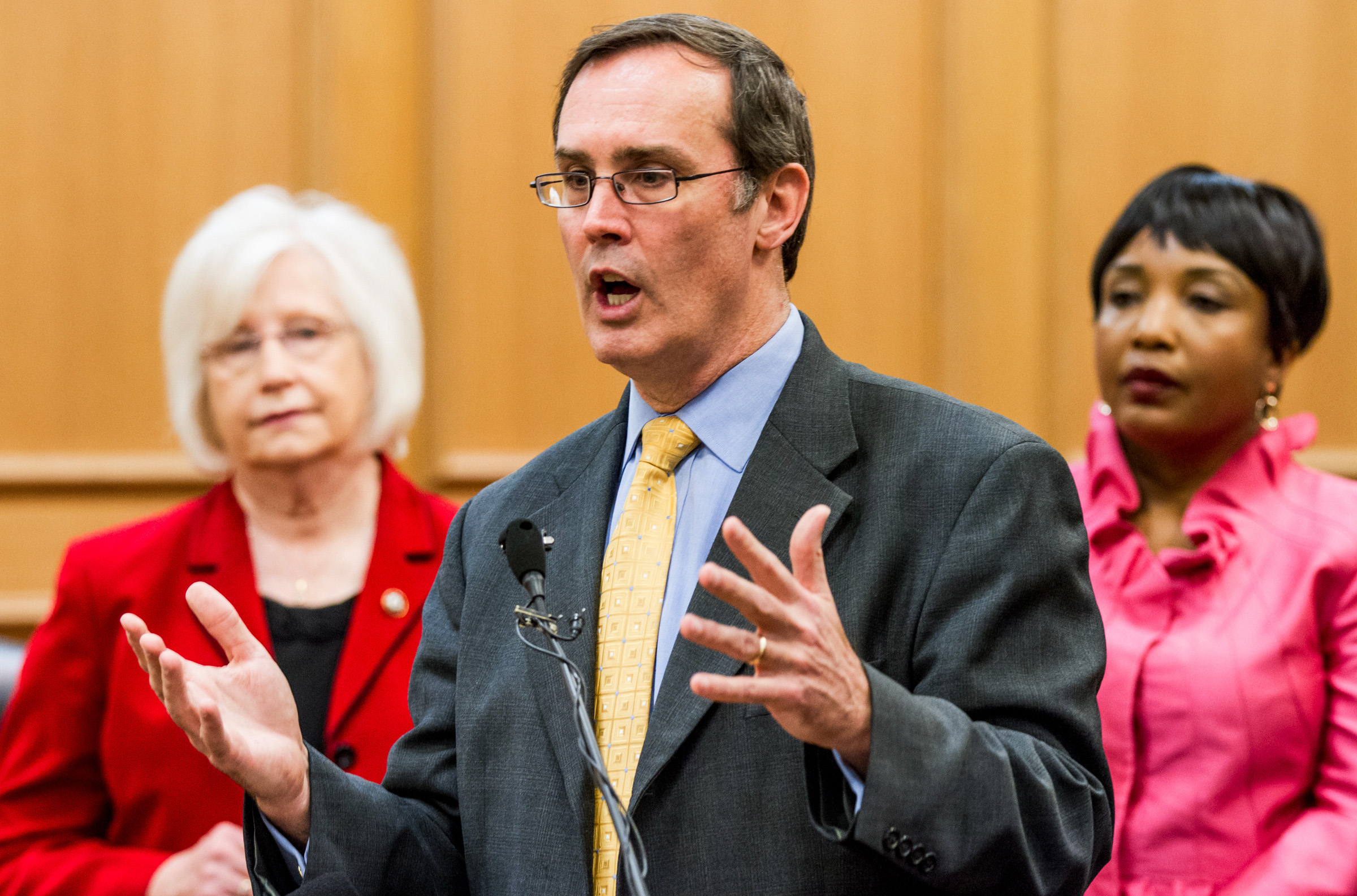NASHVILLE - A controversial transgender student bathroom bill died Monday in the Tennessee House of Representatives after the sponsor pulled the measure, leaving proponents irate and opponents celebrating.
 David Fowler, president of the Family Action Council of Tennessee, speaks at a press conference at Legislative Plaza in Nashville, Tenn., on Tuesday, March 5, 2013. Fowler spoke in favor of a bill to strip to Vanderbilt University of its police powers if it doesnt change its nondiscrimination policy for student groups. At rear are Republican Sen. Mae Beavers of Mt. Juliet, left, and Vanderbilt professor Carol Swain. (AP Photo/Erik Schelzig)
David Fowler, president of the Family Action Council of Tennessee, speaks at a press conference at Legislative Plaza in Nashville, Tenn., on Tuesday, March 5, 2013. Fowler spoke in favor of a bill to strip to Vanderbilt University of its police powers if it doesnt change its nondiscrimination policy for student groups. At rear are Republican Sen. Mae Beavers of Mt. Juliet, left, and Vanderbilt professor Carol Swain. (AP Photo/Erik Schelzig)The bill, which drew national attention and opposition from lesbian, gay, bisexual and transgender groups and 60 major businesses including Cigna Health in Chattanooga, sought to require transgender students to use public school and college bathrooms matching the biological sex listed on their birth certificates.
Upset supporters quickly blamed Republican Gov. Bill Haslam, who had voiced concerns about the legislation, as well as other opponents.
"It is no secret that the governor had concerns about the bill," said Jennifer Donnals, Haslam's press secretary.
The bill was sponsored by Rep. Susan Lynn, R-Mt. Juliet, in the House and Sen. Mike Bell, R-Riceville, in the upper chamber.
"There's definitely some issues that we need to work out," Lynn told reporters. "We know as soon as this bill passes we're going to be sued. If we're going to be headed into a lawsuit we want to make sure we have the strongest position possible."
Lynn added that "right now our schools are largely doing what this bill says. I'm confident that students are being protected right now. But this little bit of additional time will allow us to work out those issues and allow us to come back with a stronger bill and I think [one that] will be suited for a lawsuit if it comes."
David Fowler, president of the Family Action Council of Tennessee, thanked Lynn and Bell for bringing the legislation. But he also pointed a finger of blame at Haslam, saying the two lawmakers worked "in the face of consistent opposition from the governor's office and others."
He said he and others "join the thousands of parents across the state who are profoundly disappointed that at this point in the process Rep. Lynn has decided not to proceed with a bill that would have simply protected the privacy of the children they have entrusted to our public schools."
Fowler, a former Republican senator from Signal Mountain, noted there were other legislators willing to pick up the bill from Lynn, "however, it was not to be. We trust that one of them will do so next year."
The bill was opposed by the Tennessee Equality Project, the Tennessee Transgender Political Coalition, the ACLU-Tennessee and the Human Rights Campaign, the nation's largest advocacy group for lesbian, gay, bisexual and transgender people.
In a legal opinion last week, Tennessee Attorney General Herbert Slatery said the bill could cost the state $1 billion in federal Title IX education funding for public schools and colleges under the Obama administration's interpretation of the provisions.
Critics also said the legislation could hurt companies' ability to recruit workers and have a negative impact on the recruitment of new companies or expansions. Nashville officials openly fretted about the potential impact of canceled conventions. Cigna, which has a major presence in Chattanooga, said it was concerned about the impacts on recruiting employees. A transgender physician who works for the company criticized the bill.
Somewhat similar laws passed in other states this year, including North Carolina, have resulted in major corporations canceling plans to locate or expand there. In Georgia, Republican Gov. Nathan Deal vetoed a "religious freedom" bill after the television and film industry threatened to pull projects out of the state.
Fowler notes that those states' actions went well beyond the Tennessee bill.
Lynn noted there were some provisions she needed to get more information about, including whether there could be repercussions for college sports teams fielded by the University of Tennessee and other public universities under NCAA rules.
Moreover, with litigation over the Obama administration's position pending in at least two states, there could be more clarity on the overall issue, Lynn said.
She acknowledged having spoken with the governor about the legislation.
Fowler has argued the Obama administration already had been dealt setbacks in two U.S. District Courts over its extension of Title IX gender protections to transgender students.
Earlier Monday, Fowler and a group of some 30 conservative pastors held a news conference urging lawmakers to stay firm on the legislation.
"By being here today, we hope that we can lend courage to the many in our Legislature who believe that little girl and that young woman deserve respect for their privacy and, moreover, deserve protection from those in our society who have shown that they will take advantage of the situation when public policy regarding bathrooms and locker rooms shifts from a biological understanding of sex to a psychological one," Fowler said.
He urged lawmakers to show "courage" and "put their principles and their conscience above matters of mere economics."
Informed by a reporter that Lynn had pulled the bill, Rep. JoAnne Favors, D-Chattanooga, said "we can move on to taking care of the people's business with issues that take care of a lot of people. My concern was I didn't feel it merited legislation. I felt it should be handled by the schools."
Listening was Henry Seaton, an 18-year-old senior at Hendersonville's Beech High School who was born female but identifies as male. He later told reporters that if the ministers want a law requiring him to go to restrooms used by their wives and daughters, "I guess I will.
"Because I don't care where I use the restroom," he said. "They care about where I use the restroom."
Chris Sanders, executive director of the Tennessee Equality Project, said the state was inundated this year by "a flood of anti-LGBT bills," something he and others attribute to political fallout over the U.S. Supreme Court's 2015 ruling that legalized same-sex marriage.
"We can expect similar legislation next year," Sanders said. "In the end, a combination of the financial impact and lawmaker meetings with transgender students carried the day. But it was a tight battle all along. We're celebrating tonight, but we're still working on a veto of HB1840 and thinking about how we prepare for next year."
House Bill 1840 would allow mental health therapists and counselors with "sincerely held principles" to turn away or discontinue seeing LGBT clients if patients' goals conflict with their own. The bill has been sent to Haslam, who has not raised the same concerns he has over the restroom bill.
Contact Andy Sher at asher@timesfreepress.com, 615-255-0550 or follow via Twitter @AndySher1.

